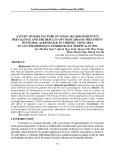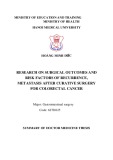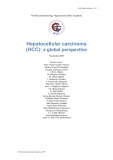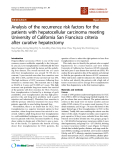
Risk factors of recurrence
-
Chronic urticaria (CU) is defined by recurrent episodes lasting for six weeks or more and generally characterized by the sudden appearance of hives (wheal), angioedema or both. Most are idiopathic, however, one of the causes of chronic urticaria can be parasitic infection, especially Toxocariasis. Albendazol is used as a treatment for Toxocariasis.
 6p
6p  viakimichi
viakimichi
 17-01-2025
17-01-2025
 4
4
 2
2
 Download
Download
-
Febrile convulsions are a fairly common emergency in children, accounting for up to 2/3 of children with symptomatic convulsions in diseases with identified causes. Febrile seizures are a medical emergency in pediatrics. Seizure recurrence can affect the child in many ways, including the risk of injury, respiratory failure during a seizure, or increased risk of epilepsy.
 7p
7p  vinara
vinara
 11-01-2025
11-01-2025
 2
2
 1
1
 Download
Download
-
Describing features of recurrence, metastasis after curative surgery for colorectal cancer; assessing outcomes of surgery for recurrent and metastatic colorectal cancer.
 30p
30p  angicungduoc6
angicungduoc6
 21-07-2020
21-07-2020
 40
40
 3
3
 Download
Download
-
Document presentation of content: Global prevalence and incidence, HCC risk factors, primary care, cascades—a resource-sensitive approach, primary HCC prevention, secondary HCC prevention—surveillance, secondary HCC prevention—surveillance, tertiary HCC prevention—recurrence.
 14p
14p  vovanvovan2013
vovanvovan2013
 13-05-2016
13-05-2016
 39
39
 3
3
 Download
Download
-
Tuyển tập báo cáo các nghiên cứu khoa học quốc tế ngành y học dành cho các bạn tham khảo đề tài: Analysis of the recurrence risk factors for the patients with hepatocellular carcinoma meeting University of California San Francisco criteria after curative hepatectomy
 6p
6p  hoami_238
hoami_238
 11-10-2011
11-10-2011
 54
54
 4
4
 Download
Download
CHỦ ĐỀ BẠN MUỐN TÌM


















